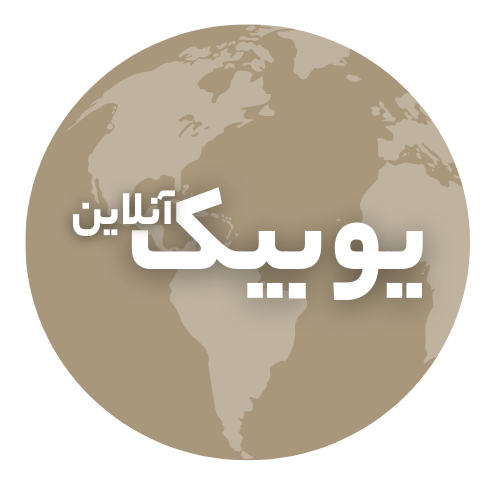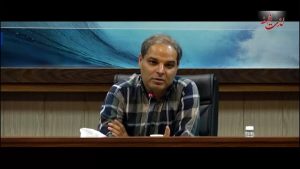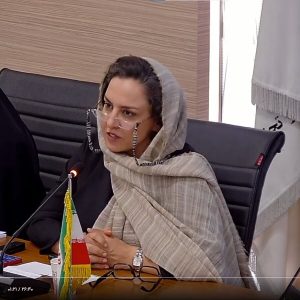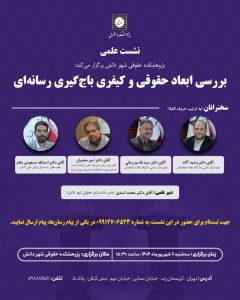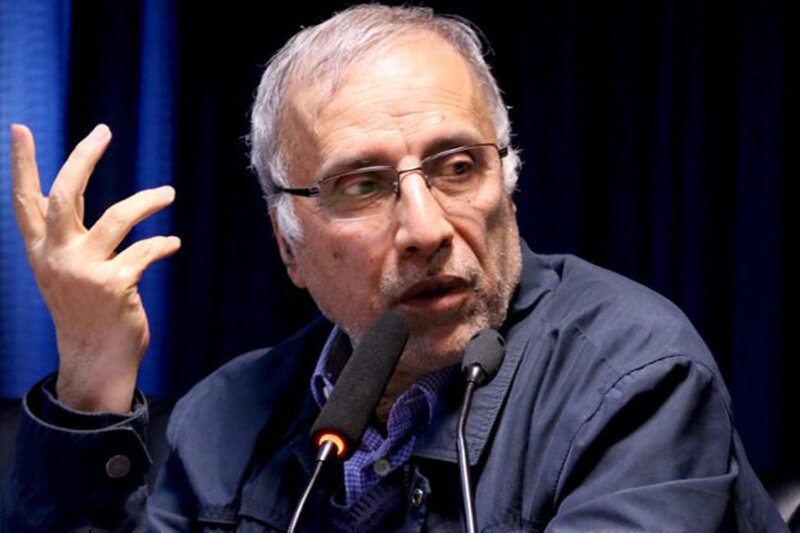
Forozan Asif Nakhai: Dr. Hadi Khaniki, a member of the communication faculty of Allameh Tabatabai University, said that “not only between the society and the governance system, but even within the governance system, there is no shared opinion about whether the Internet is an opportunity or a threat.”
According to the news agency Online newsOn the occasion of “World Internet Day”, the meeting of “Campaigns demanding the removal of filtering” was held at the Karzar Event Cafe with the presence of Internet activists, media activists, sociologists, the head of the Public Relations and Information Center of the Ministry of Communications and university professors. “The first step to solve the problems of the Internet is to be a co-problem” and said: “If we want to go in this direction, we cannot see the problem only from a political point of view; Because in Iran, if any issue becomes political, the cost of solving it will be very high.”
Khaniki then raised some important questions and said: “Perhaps it can be said that the main issue is an issue under the heading of equality.” That is, do we have a common understanding of the Internet, filtering, and the type of use of this capacity? Is the Internet an opportunity or a threat? It can be said that there is no ideological consensus at the national level, not only between the society and the governance system, but also within the governance system itself regarding the Internet and other main issues.
Khaniki went on to discuss the examples of lack of consensus in other areas, including in the country’s bureaucracy regarding water, and said: “Once upon a time in the Association for Cultural and Communication Studies, at the beginning of Mr. Rouhani’s administration, about 10 years ago, we came to this conclusion. that the water problem in Iran is very serious, it was suggested in the advertisements that citizens close the water taps well so that it does not leak. Later, they realized that the total consumption of drinking water is about 7% of water consumption. 93% of water is used in agriculture. Agricultural water has various dimensions in the field of development and development of low-water, and high-water cultivation, and the like.
He added: “The three civil institutions, the Cultural Studies Association, the Iranian Sociological Association, and the Tadbiran think tank, and the engineers of the Ministry of Energy, who had worked well in the field of water, were put together in the government with the Center for Strategic Studies, which is the president. That Mr. Dr. Ashna was an expert in the field of communication, and his deputy, Mr. Mohammad Fazli, who is a sociologist, let’s talk about this. About 17 meetings were held with these friends, Dr. Qanei Rad, the head of the Sociology Association, and myself, who was the head of the Cultural Studies Association, examined the issue from various environmental, natural, agricultural, etc. perspectives.
There is no dispute resolution mechanism in the country
This academic staff member of Allameh University then said about the lack of coordination and institutional conflict between the responsible institutions: “At first we thought that the government was in front of us (civil institutions) and we want to talk with it.” But the question arose, where should we talk to the government? Because we found out there that the Ministry of Agriculture says that this discussion is not related to the Environment Organization, another says that it is not related to the municipality, another said that if the Ministry of Energy participates in the meeting, we will not come, another said that if it is the environment, we will not. Let’s come, and… here we realized that there is a bigger problem that there are no dispute resolution mechanisms to solve the country’s problems. What is the dispute resolution mechanism? Assuming that disagreements can be resolved with the acceleration of technology, you could also say that we live in the age of the acceleration of history, as Kenneth Goulding said. If it took 39 years for 50 million people in the world to use radio, it took 13 years for 50 million people to use television and 4 years for 50 million people to use the Internet. This statistic is related to the last 20 years. Now we are seeing much more momentum.”
We found out that the Ministry of Agriculture says that this discussion is not related to the Environment Organization, another says that it is not related to the municipality, another said that if the Ministry of Energy participates in the meeting, we will not come, another said that if it is the environment, we will not come, and … here we realized that there is a bigger problem that there are no dispute resolution mechanisms to solve the country’s problems
Khaniki then raised the question, “Regarding this technology, the Internet, which is rapidly changing, will we get better results, or should we not panic?” In response to his question, he said: “My studies in Iran showed that in some places, creating fear has the opposite result. That is, when you say that the water is running out, the water consumption increases. Because a person says to himself, now that he has reached the end, why don’t I use it.”
Khaniki then divided the relationship between culture and technology into “three well-known approaches: 1-fascination, 2-persistence, 3-active or effective or appropriate adaptation” and said: “I believe that the first step is a physical one, and it is the same today. When we talk about reconciliation, I will not give it up to the choice of some official. Rather, against the platform or approach of conflict or conflict, I emphasize on the issue of Iran and the movement towards reconciliation and solidarity. If we want to go towards reconciliation, can we adopt such an approach by relying only on politics?”
Resistance to the entry of new media in Iran in the 20s
This faculty member of Allameh Tabatabai University then pointed to the control methods of the Pahlavi government in the use of radio by the people in the 1920s in Iran and said: “Look, in 1318, radio entered the country. An article in Targhee newspaper, No. 26 on 4 Azar 1325 published the news of issuing a license to use the radio. The headline of the news is that “a license must be obtained to install an antenna and use a radio.” The government at that time was not ideological, but this law was approved by the then government in the Cabinet of Ministers. Under this title, it is stated: “According to the provisions of Article 4 of the Council of Ministers’ Resolution No. 3817, to install an antenna and use any type of radio receiver, permission must first be obtained from the General Police, and after that permission from the Ministry of Posts and The telegraph and telephone were on hand for technical conditions, therefore, those who intend to use the radio receiver, must first go to the Shehrbani and obtain an installation permit after completing the prescribed formalities. He has also threatened. »»
Targhee newspaper, number 26, on 4 Azar 1325, has published the news of the issuance of a license to use the radio.
He added: “After importing the transistor radio into the country, the issue of the license was also ruled out. Then we have done the same treatment about the video. From a media point of view, video is called a rogue media. Because no one can make a policy on it. The same restrictions were applied to satellite dishes. It was not effective. Now we have reached filtering. So if we do a historical study, the matter is obvious. My advice is to depoliticize this issue. Because in Iran, any issue that becomes political, the cost of solving it increases a lot. But the historical view, along with the comparative view and what they have done in this field based on global experiences in other countries such as Malaysia, Turkey, India, and China, and which ones are similar to us, will help us a lot. And finally, what is our problem? When we correctly diagnose the problem, that solution and middle strategy will definitely be the answer. In other words, active adaptation means to make timely decisions so that the cost of work does not increase.
Khaniki then pointed to the view of the opponents of removing filtering and said: “The point is that we have to see if the other side thinks that if there is filtering, we will find more psychological security?” Does society grow morally? Then, by examining these questions, we can see in which of the two free societies or closed and limited societies, moral growth occurs? The indicators of a safe society, especially from the point of view of spirit and soul, should be examined to see what indicators it has. And students and specialists in the field of media and communication must pay attention to it.”
ISPA research report on the situation of students and universities
This university professor continued: “Two weeks ago, ISPA published a report on the state of universities and students in 91 public universities. It is interesting to know that most of the students’ free time with 233 minutes per day is spent on social networks. Therefore, with this state of the internet, students’ nerves are depleted due to the lack of internet and filter breakers, the result of which more than 44% of these students live with anxiety and apprehension every day. We can predict that a youth who lives with anxiety and fear will emerge from it, mistrusting the government and people, migration, etc. As a result, we have to come to an agreement on this, and realize that we are dealing with a different and pluralistic society with little us. That’s when we enter and approach the point of adaptation and active choice.”
Drivers of society
Khaniki further pointed to the “drivers of change in society” and said: “New societies, including Iran, can be classified into three categories in terms of drivers:
The first category is technology. Artificial intelligence has reached a point where it has turned fiction and imagination into reality. This is the driving force behind the acceleration of history. But this engine does not only produce threats, and that only for Iran, but the threats are global and, of course, more than that, it creates opportunities. The second driver is the driver of culture and content. Iran has a cultural capacity and has been able to change the invaders to its own color, including the Mongols, and has dissolved the Ghaznavids in itself. Ghaznavids came to Iran to occupy it, but Ferdowsi came out of it. Why don’t we think that our culture will grow from within the free and regulated virtual space? Why do we think this is a technology problem that should solve the problem? In my opinion, we should get the answers to these questions from culture.”
With this internet limitation, why should Persian language grow? What will happen to our universities, economy, elites?… He says that the work of the media, campaigns, NGOs, civil institutions and the work of the private sector is to find out what they want and how they want it. brings up In my opinion, planning how to want is also part of the logic of dialogue
This university professor continued by emphasizing that “with these limitations, why should the Persian language grow?” What will happen to our universities, economy, elites? He pointed to Pishran Som and said: “In Pishran Som, my attention is to you as a designer of demands, rights, and raising awareness, so a communication rule can be raised here.” Lerner’s research in six Middle Eastern countries is important even when there are no virtual networks and media. It’s like great media for Lerner, radio, and TV. Lerner’s first opinion is that in order to modernize societies, the media must raise modern demands, but later Lerner criticizes his opinion: after 10 years, Lerner reviewed his opinion and proposed that the revolution of increasing expectations, to The revolution leads to growing frustrations. Therefore, in such societies, the society not only does not advance towards modernity, but also undergoes severe regression. In modern history, Afghanistan has been much ahead of Iran, including the university system, including Kabul University, was established earlier than Tehran University, but this means that if we do not pay attention to how development is realized, the trends can be reversed, and Development trends are reversible trends.
Khaniki continued: “Lerner then reaches a conclusion that is my last word. That is, he says that the work of the media, campaigns, NGOs, civil organizations, and the work of the private sector is to propose what they want and how they want it. In my opinion, planning how to want is also part of the logic of dialogue. You may find other examples for this general statement of mine, but now if you want to raise the first point, which is also a point of departure, in my opinion, a comprehensive understanding and a common understanding of the Internet issue, the capacity There is no such thing as internet problems, filtering problems, etc., we must raise this common understanding. Its levels are clear. One level is that of governance, for which Ajemoglu won the Nobel Prize, it is empowering the government, one level of his discussion is elites and reference groups, another level is civil society and, accordingly, society.
Read more:
Reza Davari: It is not known where the world is going / war is called peace and slavery is called freedom and… / the cunning of reason and the deception of history
Iran’s friendship with doctors is in the process of implementing this quick-written recommendation
How to recognize cunning people?
216216
منبع: www.khabaronline.ir
